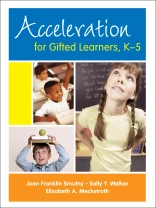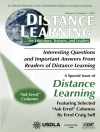‘Smutny has assembled a group of colleagues who bring very practical and useful insights to this issue and suggest practices that will make the use of this important curricular modification justifiable, manageable, and, most of all, normal. Acceleration is not treated as a strategy of last resort but as a logical and reasonable way to acknowledge and provide for the growth and continuous progress of all children. By broadening the idea of acceleration as a way to meet academic, emotional, and social needs, the book turns the concerns about acceleration into strengths.’
—Barbara Clark, Professor Emeritus, California State University, Los Angeles
‘A well-written, extremely useful guide for parents and educators who wish to provide gifted students an opportunity to learn at a pace and level appropriate to their abilities. Offers valuable insight on the social and emotional aspects of effective acceleration.’
—Jan Davidson, President and Cofounder, Davidson Institute for Talent Development
Coauthor, Genius Denied: How to Stop Wasting Our Brightest Young Minds
Raise the bar on accelerated learning and discover new possibilities that go beyond minimum proficiency!
Written for K–5 teachers, this practical guide corrects misunderstandings in the field of acceleration and provides the tools necessary to effectively determine the most appropriate learning options for gifted students. Through real-life stories, well-known authors in gifted education Joan Franklin Smutny, Sally Y. Walker, and Elizabeth A. Meckstroth, dispel the common myths about acceleration and describe what it is, what forms it takes, and what it can do for gifted learners—intellectually, socially, and emotionally.
Presenting nuts-and-bolts guidance, this valuable resource provides:
- Numerous case studies, helpful checklists, and reproducible forms
- Prevailing theories and current research
- Social-emotional aspects of acceleration practices
- Instructional strategies for implementation in various school settings
- Learning opportunities for underserved groups, such as multicultural and urban students
- Bibliographies and helpful Web sites
Offering a new perspective on how prevailing attitudes have deprived students of opportunities to develop their talents, Acceleration for Gifted Learners, K–5 , directly reflects the 2004 Templeton Report in validating the urgency to meet gifted students′ needs.
สารบัญ
Preface
Acknowledgements
About the Authors
Introduction
Part I: Acceleration: Issues and Applications for Gifted Learners (K-5)
1. Acceleration and the K-5 Gifted Child
2. Acceleration in a Differentiated Classroom
3. Acceleration and Creativity: Closing the Gap
4. Assessment for Accelerated Learners
Part II: Appropriate Academic-Classroom Acceleration
5. Acceleration of Content
6. The Thinking Process
7. Product Development
8. Standards and Policy
Part III: Social and Emotional Aspects of Effective Acceleration
9. Obstacles to Acceleration
10. Adaptations to Personality
11. Facilitating Acceleration
12. Social Relationships
13. Facilitating Acceleration for Parents and Educators
References
Index
เกี่ยวกับผู้แต่ง
Joan Franklin Smutny is founder and director of the Center for Gifted, a Northern Illinois University Partner. She directs programs for thousands of bright, talented, and gifted children in the Chicago area annually. She also teaches creative writing in many of these programs as well as courses on gifted education for graduate students at the university level. She is editor of the Illinois Association for Gifted Children Journal, contributing editor of Understanding Our Gifted, and a regular contributor to the Gifted Education Communicator, Parenting for High Potential, and the Gifted Education Press Quarterly. Smutny has authored, co-authored, and edited many articles and books on gifted education for teachers, parents, and administrators, including Challenging High Potential Spanish Speaking Students (2012), Teaching Advanced Learners in the General Education Classroom (2011), Manifesto of the Gifted Girl (2010), Differentiating for the Young Child, Second Edition (2010), Igniting Creativity in Gifted Learners, K–6 (2009), Acceleration for Gifted Learners, K–5 (2007), Reclaiming the Lives of Gifted Girls and Women (2007), Designing and Developing Programs for Gifted Students (2003), Underserved Gifted Populations (2003), Gifted Education: Promising Practices (2003), Stand Up for Your Gifted Child (2001), The Young Gifted Child: Potential and Promise, an Anthology (1998), and Teaching Young Gifted Children in the Regular Classroom (1997). In 1996, she won the National Association for Gifted Children (NAGC) Distinguished Service Award for outstanding contribution to the field of gifted education.












